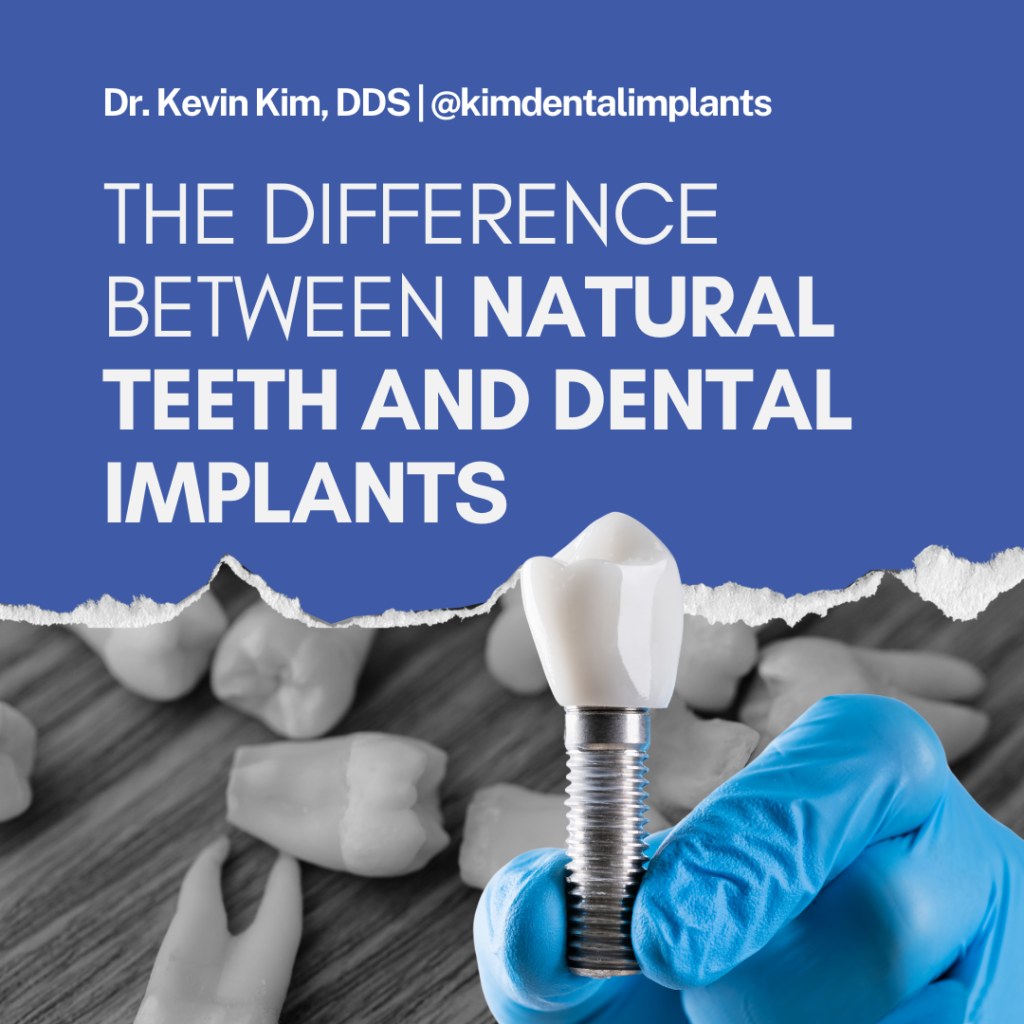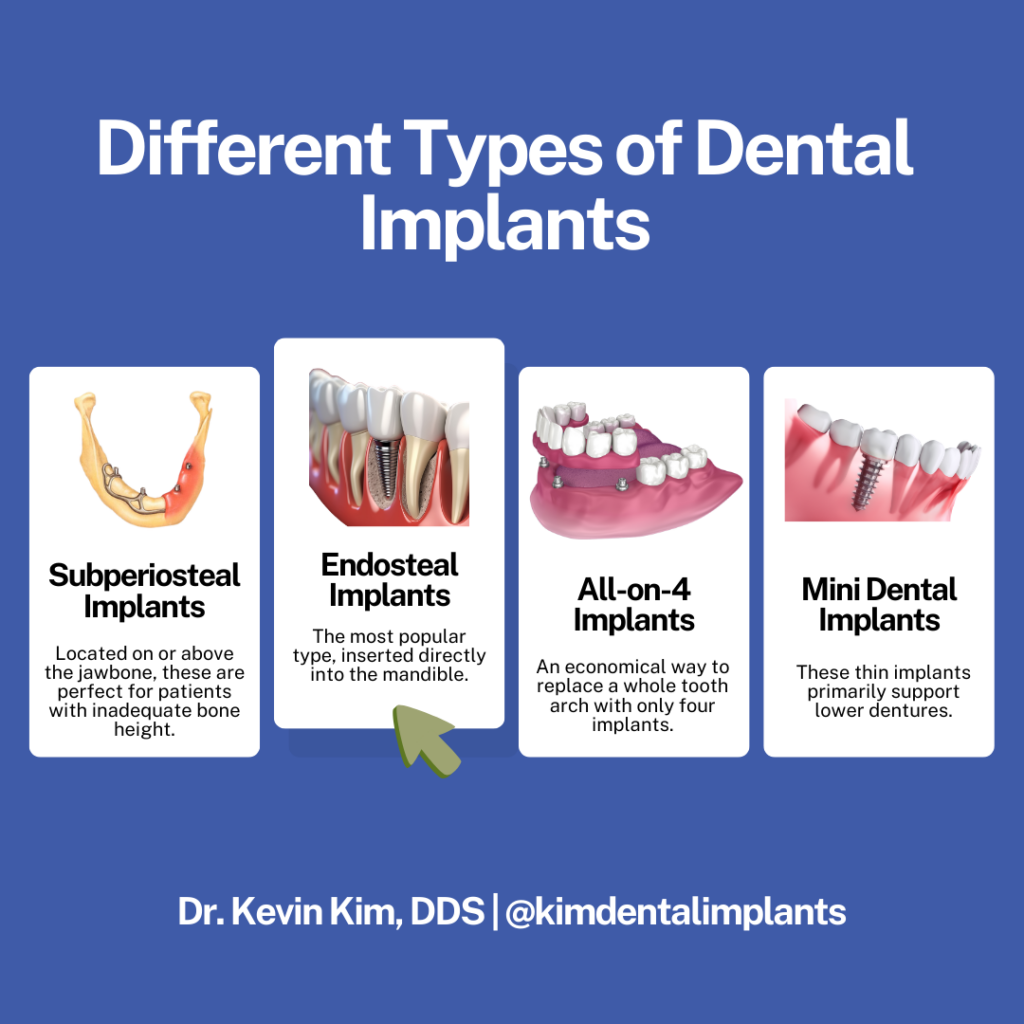The Difference Between Natural Teeth and Dental Implants

I’m thrilled to share my knowledge of the intriguing field of dental implants and how they differ from natural teeth in my capacity as Dr. Kevin Kim, DDS. At Kim Dental Implants, we offer a variety of implant treatments, including high-risk case alternatives and repairs, to support optimal oral health. Our comprehensive care extends to Washington dental implants, ensuring patients have access to advanced solutions following procedures like tooth extraction.


Understanding Natural Teeth and Dental Implants
The main purpose of both natural teeth and dental implants is to enable us to confidently chew, speak, and smile. However, they differ greatly in their structures and interactions with human bodies, especially when comparing procedures like root canals, which aim to preserve a natural tooth, to the placement of dental implants as a replacement option.
Root Structure
Periodontal ligaments encircle the roots of natural teeth and extend into the jawbone. These ligaments permit little motions and have a mild cushioning effect. Proper brushing and flossing are essential to maintain the health of these ligaments and prevent tooth loss.
In contrast, osseointegration fixes dental implants directly to the jawbone, causing the implant and bone to become firmly attached and providing a stable solution for replacing missing teeth.
Sensory Feedback
Nerves in natural teeth give us sensory feedback, which enables us to perceive warmth and pressure. Patients may need time to adjust to the loss of sensory capabilities in implants. Unlike natural teeth, dental implant surgery places the implant directly into the jawbone without nerve connections, while preserving the stability of adjacent teeth since they are not impacted or used for support.
Types of Dental Implants We Offer
To meet diverse demands, Kim Dental Implants offers a range of implant options, each designed to blend seamlessly with your smile using tooth-colored materials and to support your ability to brush your teeth with ease:

- Endosteal Implants: The most popular type, inserted directly into the mandible.
- Subperiosteal Implants: Located on or above the jawbone, these are perfect for patients with inadequate bone height.
- All-on-4 Implants: An economical way to replace a whole tooth arch with only four implants.
- Mini Dental Implants: These thin implants primarily support lower dentures.
These implant options prioritize aesthetics and functionality, ensuring you can maintain good oral hygiene, including brushing your teeth, with confidence.
Learn more: Our Implant Services
Implant Repairs and High-Risk Cases
We are aware that issues or implant failures can occasionally arise. Our staff has extensive experience in dental care, particularly with high-risk patients and implant repairs. Among the repair techniques we use to ensure that your tooth is replaced properly are:
- Implant Replacement and Removal: When required, we replace or carefully remove failed implants to restore your smile and functionality.
- Bone Grafting: Restoring lost bone density and establishing a strong base for new implants are the goals of bone grafting, ensuring better stability for your replacement tooth.
- Guided Tissue Regeneration: A specialized method to promote the formation of new soft tissue and bone, which helps maintain overall oral health and supports the new implants.
We provide the following solutions for high-risk situations, such as individuals with low bone density or those who have had prior implant failures:
- Zygomatic Implants: Perfect for severe upper jaw bone loss, these implants are anchored to the cheekbone to replace missing teeth in challenging cases.
- Immediate Load Implants: When appropriate, immediate load implants enable the same-day implantation of temporary teeth, minimizing the time without a replacement tooth.
Our expertise ensures we tackle even the most challenging cases with effective solutions to replace your tooth and maintain excellent dental care.
Learn more: Implant Restoration Options
Maintenance and Longevity
Dental implants are impervious to deterioration, in contrast to natural teeth. To avoid gum disease and guarantee long-term success, both, however, need to practice good dental hygiene.
Dental implants frequently outlast natural teeth and can last a lifetime with the right maintenance and care from skilled oral surgeons. Both natural teeth and implants require routine examinations and expert cleanings to ensure their longevity and overall oral health.
Learn more: Maintenance and Aftercare
Personalized Dental Implant Care for Your Unique Needs
Our goal at Kim Dental Implants is to give each patient individualized care. Our staff, including experienced restorative dentists, can assist you whether you’re thinking about getting your first implant, require a repair, or have a complicated case. To guarantee the greatest results, we combine years of knowledge with state-of-the-art technology and meticulous treatment planning.
Although dental implants are a great way to replace lost teeth, keep in mind that they also offer the potential for enhanced quality of life and reassurance. We encourage you to make an appointment for a consultation if you’re interested in learning more about how dental implants might help you. Together, we will create the smile you deserve.